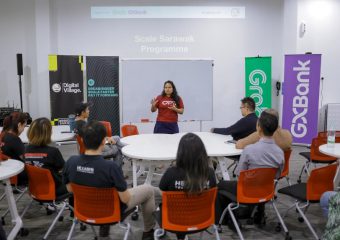Sarawak is now gearing itself towards a digital economy, where technological advancements have challenged and disrupted traditional business models and subsequently accelerated the socioeconomic growth of numerous countries around the world.
The state’s commitment was clearly reflected during the recent International ICT Infrastructure & Digital Economy Conference Sarawak (IDECS) 2017, where around 2,000 participants had the opportunity to learn and understand the latest digital trends, innovations and developments from local and international industry experts.
Their presentations on various aspects of digital economy were enlightening, educational and valuable, especially for Sarawakian youths who will be contributing to the state’s economy and development in the future.
As a refresher from the two-day conference, here are a few things that we learnt for you to prepare yourself for the digital economy:
Staying updated is essential
Technology changes rapidly, so it’s crucial to keep up with the latest technological trends regardless of disciplines. For example, technological innovations such as bitcoin, blockchain, virtual reality (VR), robotics, data analytics and cloud computing are now commonplace in every industry.
It would also be helpful to learn about and experience these technological innovations to have a better understanding on their nature and potential.
Learning ICT skills without leaving home
You can learn technology-related skills on your own by taking free courses online, from the likes of Coursera, edX and Khan Academy.
Having these skills also gives you the advantage of being able to work with overseas companies via remote working, which only requires the necessary apps, your laptop and a good Internet connection as you work from home.
Finding a problem to solve
Companies such as Lazada, Grab and AirAsia, as well as social enterprises, were established under this fundamental premise, where they would use current technology to overcome challenges confronting their businesses. It would be more valuable if the business that you intend to start benefits your community in the long run.
Soft skills remain relevant
Ultimately, a balance between technical and non-technical skills matters most when it comes to becoming capable and competent in the digital economy. Because technology cuts across all industries, employers prefer to hire candidates who can solve problems, collaborate with others and communicate effectively.
As technology affects the nature of jobs, it is also vital to be flexible and adaptable to the changes that will inevitably affect your working life. As such, be willing to learn new things even as you grow older.
This is a weekly column by SarawakYES! – an initiative driven by Faradale Media-M Sdn Bhd and supported by Angkatan Zaman Mansang (AZAM) Sarawak – to provide advice and stories on the topics of education and careers to support Sarawakians seeking to achieve their dreams. Join us on Facebook, Twitter, Instagram and YouTube.
This article first appeared on The Borneo Post, visit this link: http://bit.ly/2oQeKGE




